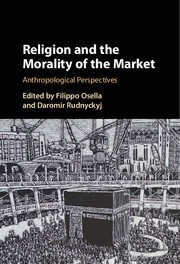Book contents
- Frontmatter
- Dedication
- Contents
- List of Figures
- List of Contributors
- Acknowledgments
- Introduction: Assembling Market and Religious Moralities
- 1 Risk, Fate, Fortune: The Lives and Times of Customs Inspectors in Southern China
- 2 Morality, Markets, and the Gospel of Prosperity
- 3 Religious Myths Retold: Masters and Servants in India's Corporate Culture
- 4 Divine Markets: Ethnographic Notes on Postnationalism and Moral Consumption in India
- 5 Merit Economies in Neoliberal Times: Halal Troubles in Contemporary Sri Lanka
- 6 “Structural Adjustment Islam” and the Religious Economy in Neoliberal Mali
- 7 Assembling Islam and Liberalism: Market Freedom and the Moral Project of Islamic Finance
- 8 Persistent Forms: Catholic Charity Homes and the Limits of Neoliberal Morality
- 9 Marketizing Piety through Charitable Work: Islamic Charities and the Islamization of Middle- Class Families in Indonesia
- 10 “A Poor Muslim Cannot Be a Good Muslim”: Islam, Charitable Giving, and Market Logic in Sri Lanka
- 11 “For God and the Country”: Agricultural Migrations and their Moralities in South India
- 12 “The Globalization of Indifference”: On Pope Francis, Migration and Global Acedia
- Index
- References
5 - Merit Economies in Neoliberal Times: Halal Troubles in Contemporary Sri Lanka
Published online by Cambridge University Press: 13 April 2017
- Frontmatter
- Dedication
- Contents
- List of Figures
- List of Contributors
- Acknowledgments
- Introduction: Assembling Market and Religious Moralities
- 1 Risk, Fate, Fortune: The Lives and Times of Customs Inspectors in Southern China
- 2 Morality, Markets, and the Gospel of Prosperity
- 3 Religious Myths Retold: Masters and Servants in India's Corporate Culture
- 4 Divine Markets: Ethnographic Notes on Postnationalism and Moral Consumption in India
- 5 Merit Economies in Neoliberal Times: Halal Troubles in Contemporary Sri Lanka
- 6 “Structural Adjustment Islam” and the Religious Economy in Neoliberal Mali
- 7 Assembling Islam and Liberalism: Market Freedom and the Moral Project of Islamic Finance
- 8 Persistent Forms: Catholic Charity Homes and the Limits of Neoliberal Morality
- 9 Marketizing Piety through Charitable Work: Islamic Charities and the Islamization of Middle- Class Families in Indonesia
- 10 “A Poor Muslim Cannot Be a Good Muslim”: Islam, Charitable Giving, and Market Logic in Sri Lanka
- 11 “For God and the Country”: Agricultural Migrations and their Moralities in South India
- 12 “The Globalization of Indifference”: On Pope Francis, Migration and Global Acedia
- Index
- References
Summary
On the evening of 15 June 2014, violence erupted in southern Sri Lanka. During two days of violence, Sinhala mobs systematically attacked Muslim shops and homes in the towns of Aluthgama, Dharga town, Welipanna and Beruwela, causing three deaths and massive damage to property. Anti-Muslim sentiment had been simmering in postwar Sri Lanka for some time, and was mobilized through the 2012 launch of the BoduBalaSena (BBS), a Sinhala Buddhist nationalist group led by monks. Their massive public meetings – featuring saffron-robed monks and white-clad lay audiences, loudspeakers blaring rhetorical exhortations to violence – led to many incidents of harassment of Muslims throughout the island. The first issue that the BBS chose by which to mobilize Buddhists against Muslims was halal certification of consumer goods.
In late 2012, the BBS objected to halal labels appearing on products on retail shelves, arguing that it was an imposition of the practice of one religious group onto citizens of other religions. They stated that while halal labelling was permissible for export purposes, if practiced locally it should be restricted to Muslim-only shops, perhaps run by mosques, and not forced on those who were not Muslim. This chapter examines how Sri Lanka's halal economy was variously characterized by the BBS, Muslim organizations and press commentators, both in terms of the market logic that has been applied to the Sri Lankan economy since the 1977 liberalization and in terms of a particular postwar modality of nationalism. I will argue that the ethnic animosity targeting Muslims in contemporary Sri Lanka was precipitated by long-term policies of economic liberalization which, in recent years, have been framed by the logics of neoliberalism. Whilst the BBS and other nationalist groups wanted Muslims (and other minorities) to acknowledge their place as a secondary social group in a Sinhala-Buddhist nation, they were also committed to the government's development strategy directed towards making Sri Lanka more economically competitive. Committed to the state's project of neoliberal reforms, the Muslim entrepreneurial and professional classes, in turn, analysed the crisis in economic terms. They engaged in a resignification of halal purely as an economic activity.
- Type
- Chapter
- Information
- Religion and the Morality of the Market , pp. 116 - 137Publisher: Cambridge University PressPrint publication year: 2017
References
- 6
- Cited by

